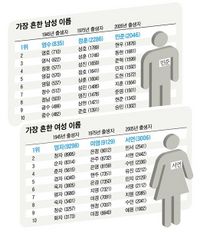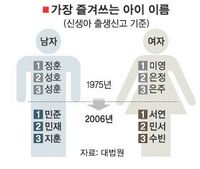Difference between revisions of "Korean names"
(reordered, added a lot of new text and a few explanations, spaced elements. This page is in need of a check after my work.) |
m (→Structure and Arrangement) |
||
| (3 intermediate revisions by 3 users not shown) | |||
| Line 6: | Line 6: | ||
Whereas Western names often consist of three parts (a first name, a middle name, and a last name), Korean names have two parts: a given name and a family name. These two parts are arranged with the family name appearing first and the given name second. | Whereas Western names often consist of three parts (a first name, a middle name, and a last name), Korean names have two parts: a given name and a family name. These two parts are arranged with the family name appearing first and the given name second. | ||
* '''Formula:''' ''(Family Name)'' + ''(Given Name)'' = ''(Full Name)'' | * '''Formula:''' ''(Family Name)'' + ''(Given Name)'' = ''(Full Name)'' | ||
| − | ** ''' | + | ** '''이''' + '''민수''' = '''이민수''' |
| − | *** | + | *** 이 = Family name, 민수 = Given name |
| − | ** ''' | + | ** '''노''' + '''준하''' = '''노준하''' |
| − | *** | + | *** 노 = Family name, 준하 = Given name |
| − | + | ||
| − | + | ||
| − | + | ||
| + | When both the given and family names are counted together, there are usually three syllables. The family name often holds one syllable while the given name holds the other two syllables. There also exists two-syllable family name. Given name is sometimes one syllable or more than two syllables. However, it is not possible for a Korean person to have a given name with more than five syllables. | ||
==Romanization== | ==Romanization== | ||
When Korean names are [[Romanization|Romanized]], three forms are usually held, all of which place the family name after the given name, following the Western order: | When Korean names are [[Romanization|Romanized]], three forms are usually held, all of which place the family name after the given name, following the Western order: | ||
| − | * '''The syllables of the given name are separated with a dash.''' | + | * '''The syllables of the given name are conjoined.''' This is the most common method. |
| − | ** 이민수 = Min-su | + | ** 이민수 = Lee Minsu |
| − | ** 노준하 = | + | ** 노준하 = No Junha |
| − | * '''The syllables of both the given name and the family name are separated with spaces.''' The syllables separated with this method each hold a beginning capital letter. | + | * '''The syllables of the given name are separated with a dash.''' People use this form to emphasize that two parts are separated syllables. The second syllable of given name is not capitalized. |
| + | ** 이민수 = Lee Min-su | ||
| + | ** 노준하 = No Jun-ha | ||
| + | |||
| + | The above two methods are standardized Romanization of Korean names established by the National Institute of the Korean Language. But this standard format is not obeyed. Some people reverse the order of family name and given name, capitalize second syllable of given name or separate two syllables of given name as follows. | ||
| + | |||
| + | * '''The syllables of both the given name and the family name are separated with spaces.''' The syllables separated with this method each hold a beginning capital letter. But the second syllable of given name is often considered as middle name, so it is omitted or initialized. To prevent this problem, this format is not recommended. | ||
** 이민수 = Min Su Lee | ** 이민수 = Min Su Lee | ||
| − | ** 노준하 = | + | ** 노준하 = Jun Ha No |
| − | + | ||
| − | + | ||
| − | + | ||
| − | + | ||
==Common Family Names (in Order of Frequency)== | ==Common Family Names (in Order of Frequency)== | ||
<!--[do you have a list of how many people have these names?]--> | <!--[do you have a list of how many people have these names?]--> | ||
| − | 김, 이, 박, 최, 정, 강, 조, 윤, 장, 임, 한, 신, 오, 서, 권, 황, 송, 안, 유, 홍, 전, 고, 문, 손, 양, 배, 백, | + | 김, 이, 박, 최, 정, 강, 조, 윤, 장, 임, 한, 신, 오, 서, 권, 황, 송, 안, 유, 홍, 전, 고, 문, 손, 양, 배, 백, 초, 허, 남, 심, 유, 노 |
| − | + | ||
| − | + | ||
==Common Given Names== | ==Common Given Names== | ||
| Line 45: | Line 43: | ||
*수진, 수정 | *수진, 수정 | ||
*슬기 | *슬기 | ||
| − | *예림, 예원, 예지, 예진, | + | *예림, 예원, 예지, 예진, |
*은경, 은선, 은영, 은정, 은주, 은지, 은혜 | *은경, 은선, 은영, 은정, 은주, 은지, 은혜 | ||
*유경, 유나, 유리, 유진 | *유경, 유나, 유리, 유진 | ||
| Line 56: | Line 54: | ||
===Male Names=== | ===Male Names=== | ||
| − | In alphabetic order: | + | In Korean alphabetic order: |
*도현 | *도현 | ||
*동현 | *동현 | ||
| Line 70: | Line 68: | ||
*정민, 정우, 정호, 정훈 | *정민, 정우, 정호, 정훈 | ||
*지석, 지훈 | *지석, 지훈 | ||
| − | *진석, 진수, 진우, 진호 | + | *진석, 진수, 진우, 진호 |
*태석, 태준 | *태석, 태준 | ||
*현수, 현준, 현철 | *현수, 현준, 현철 | ||
| Line 77: | Line 75: | ||
===Unisex Names=== | ===Unisex Names=== | ||
| − | In alphabetic order: | + | In Korean alphabetic order: |
*경진 | *경진 | ||
*민서 | *민서 | ||
| Line 95: | Line 93: | ||
| − | ==Explanations and Opinions== | + | ==See Also== |
| + | *[[Hanja#Common_Hanja_used_in_names | Names written in hanja]] | ||
| + | ===Explanations and Opinions=== | ||
* [http://galinaros.wordpress.com/2010/06/25/korean-names/ Fathoms: Korean and English] | * [http://galinaros.wordpress.com/2010/06/25/korean-names/ Fathoms: Korean and English] | ||
* [http://en.wikipedia.org/wiki/Korean_name Wikipedia on Korean names] | * [http://en.wikipedia.org/wiki/Korean_name Wikipedia on Korean names] | ||
[[Category:Articles]] | [[Category:Articles]] | ||
Latest revision as of 06:50, 29 May 2021
| |
Contents
Structure and Arrangement
Whereas Western names often consist of three parts (a first name, a middle name, and a last name), Korean names have two parts: a given name and a family name. These two parts are arranged with the family name appearing first and the given name second.
- Formula: (Family Name) + (Given Name) = (Full Name)
- 이 + 민수 = 이민수
- 이 = Family name, 민수 = Given name
- 노 + 준하 = 노준하
- 노 = Family name, 준하 = Given name
- 이 + 민수 = 이민수
When both the given and family names are counted together, there are usually three syllables. The family name often holds one syllable while the given name holds the other two syllables. There also exists two-syllable family name. Given name is sometimes one syllable or more than two syllables. However, it is not possible for a Korean person to have a given name with more than five syllables.
Romanization
When Korean names are Romanized, three forms are usually held, all of which place the family name after the given name, following the Western order:
- The syllables of the given name are conjoined. This is the most common method.
- 이민수 = Lee Minsu
- 노준하 = No Junha
- The syllables of the given name are separated with a dash. People use this form to emphasize that two parts are separated syllables. The second syllable of given name is not capitalized.
- 이민수 = Lee Min-su
- 노준하 = No Jun-ha
The above two methods are standardized Romanization of Korean names established by the National Institute of the Korean Language. But this standard format is not obeyed. Some people reverse the order of family name and given name, capitalize second syllable of given name or separate two syllables of given name as follows.
- The syllables of both the given name and the family name are separated with spaces. The syllables separated with this method each hold a beginning capital letter. But the second syllable of given name is often considered as middle name, so it is omitted or initialized. To prevent this problem, this format is not recommended.
- 이민수 = Min Su Lee
- 노준하 = Jun Ha No
Common Family Names (in Order of Frequency)
김, 이, 박, 최, 정, 강, 조, 윤, 장, 임, 한, 신, 오, 서, 권, 황, 송, 안, 유, 홍, 전, 고, 문, 손, 양, 배, 백, 초, 허, 남, 심, 유, 노
Common Given Names
Female Names
In alphabetic order:
- 다빈
- 미경, 미나, 미선, 미영, 미정, 미현
- 민선, 민정, 민진, 민지
- 서연, 서현, 서영
- 소영, 소현
- 수진, 수정
- 슬기
- 예림, 예원, 예지, 예진,
- 은경, 은선, 은영, 은정, 은주, 은지, 은혜
- 유경, 유나, 유리, 유진
- 정은, 정희
- 지민, 지선, 지연, 지영, 지은, 지현, 지혜
- 한별
- 현영, 현정, 현주, 현지, 현희
- 혜선, 혜영, 혜정, 혜진
- 효정
Male Names
In Korean alphabetic order:
- 도현
- 동현
- 명철, 명호
- 민석, 민성, 민수, 민우, 민재, 민준, 민호
- 상현, 상훈
- 성준, 성진, 성호, 성훈
- 승민, 승준
- 영준, 영호
- 인석, 인호
- 재민, 재석, 재호
- 준서, 준성, 준석, 준수, 준영, 준혁, 준형, 준호
- 정민, 정우, 정호, 정훈
- 지석, 지훈
- 진석, 진수, 진우, 진호
- 태석, 태준
- 현수, 현준, 현철
- 효석, 효준
- 현석, 현수, 현우, 현호
Unisex Names
In Korean alphabetic order:
- 경진
- 민서
- 성민
- 세진
- 수민, 수빈
- 영진
- 정민, 정원, 정윤, 정현
- 주현
- 지원, 지수
- 태희
- 하늘
- 한솔
- 현진
- 희원

